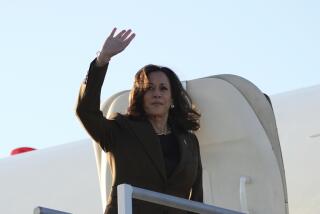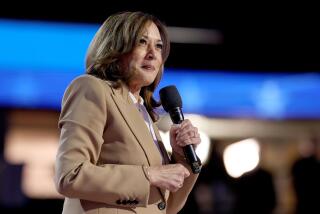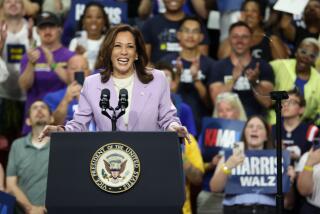Dean Leading Party in ‘Money Primary’
Having already eclipsed a fund-raising record for Democratic presidential candidates, former Vermont Gov. Howard Dean came to Los Angeles on Monday for an unusual nationwide conference call to exhort his supporters to drum up even more money.
Dean was the guest of honor at a local “house call party” -- one of an estimated 1,500 such gatherings across the country Monday run by his campaign.
The events, promoted as “Dr. Dean’s House Call,” underscored the innovative organizing techniques that have marked his candidacy, including extensive use of the Internet.
During the conference call, Dean outlined his vision for the country, boasted of his plans to energize disenfranchised voters and attacked President Bush’s policies on the environment, AIDS, racial discrimination and national defense.
By talking to a large group of supporters in one call, Dean was seeking to boost to $15 million the amount he raised for the year’s third quarter, which ends tonight. His campaign’s Web site, updated every few hours in a manner reminiscent of a telethon, reported that as of Monday night, he had raised more than $13 million since July 1.
That topped the previous party record of $10.3 million that then-President Clinton set for one quarter eight years ago, and was expected to far exceed what any of Dean’s Democratic opponents would report in donations in the last three months.
“I never talk about me going to the White House,” Dean told supporters as he spoke from the modest Mid-Wilshire home of social activists Gary Phillips and Gilda Haas. “I always talk about us going to the White House.”
He addressed about two dozen backers and reporters in a small living room, with thousands of others listening in on what his campaign claimed would be a record-setting conference call.
After the event, campaign staff said the conference call was linked to 3,557 phones. If accurate, the number of telephone links breaks the previous record held by a British pop group that linked up to 3,310 fans in 2000.
Earlier, in an e-mail to supporters, Dean wrote: “By joining with countless others who are taking action right now, you not only will shake the foundations of the political establishment, you will prove that the American people have the strength to restore a politics of participation in our country.”
President Bush showed even more money-making muscle; his campaign announced that he was on track to raise $48 million to $50 million for the quarter, a new record for any presidential candidate. The previous high, according to the Federal Election Commission, was Bush’s $35.1 million in the second quarter of this year. Bush has now raised more than $80 million this year for his reelection fund, about half his $170-million goal, said White House spokesman Scott Stanzel.
The president was traveling to Chicago and Cincinnati for fund-raising events today. Bush has no competition for the Republican nomination. In contrast, the Democratic race is an intensely competitive, 10-candidate affair. Each of the contenders is striving to demonstrate momentum -- or at least viability -- through fund-raising. Today’s deadline loomed large in what insiders called the “money primary” -- the process of wooing donors before January’s crucial early contests in Iowa and New Hampshire.
Among the other nine Democratic candidates, Sen. John F. Kerry of Massachusetts announced through an aide Monday that he was expecting to raise $4.5 million to $5 million for the third quarter. Sen. Joe Lieberman of Connecticut was expecting about $4 million, a spokesman said. An aide to Sen. John Edwards of North Carolina said he was expecting less than $4 million.
Aides to Rep. Richard A. Gephardt of Missouri, Sen. Bob Graham of Florida and retired Gen. Wesley Clark of Arkansas declined to discuss fund-raising totals. Three other candidates -- Rep. Dennis J. Kucinich of Ohio, former Sen. Carol Moseley Braun of Illinois and the Rev. Al Sharpton of New York -- are running longshot, low-budget campaigns.
The final quarterly figures for all candidates will be made public in mid-October. A major unknown is how much money Clark has been able to raise since his late entry into the race shook up the field earlier this month. Associated Press reported that Clark’s total is expected to be $2 million or more. If the retired general can approach in two weeks what Kerry and Lieberman raised in three months, he will solidify his status as a competitive, top-tier candidate.
But Dean has staked a claim as the undisputed front-runner and probable victor in the 2003 money primary, a major boost for him as the candidates begin a period of intensive campaigning. For the year, he has raised more than $23 million. Kerry ranked second with more than $20 million, including money transferred from an earlier Senate campaign.
Political analysts view Dean’s total as particularly impressive, given that he began his campaign as an obscure politician from one of the nation’s least-populous states.
“This guy’s doing phenomenally well,” said Charlie Cook, an independent Washington-based political analyst. Cook noted that most recent major-party presidential nominees raised more money than any of their partisan rivals in the year before an election -- a feat Dean seems on track to replicate. “That’s huge,” Cook said.
Even rival Democrats acknowledged Dean’s financial prowess.
“It’s quite amazing, isn’t it?” said Kristian Denny, a Graham spokeswoman. “It changes the playing field, no doubt.”
Kerry spokesman Robert Gibbs conceded that Dean had “an impressive quarter.”
With his fund-raising edge, Dean is drawing increasingly heavy fire from rivals. Gephardt has attacked him for remarks he made in the mid-1990s that backed trimming the Medicare budget. Lieberman and Kerry have questioned what they say are Dean’s shifting statements on the Israeli-Palestinian conflict.
Most of the candidates have questioned whether Dean has the stature to take on Bush, and many strategists say Dean’s opposition to the Iraq war could prove a liability in a matchup with a wartime president.
But Dean has dismissed such criticism, insisting that he speaks for the angry majority of Democrats who want to confront Bush head-on.
“The way we are going to beat George Bush is not to be Bush light,” he said, talking into the speaker phone. “We are not going to be Washington insiders.... We are going to stand up for what we believe. We are going to be proud to be Democrats again and we are going to give the 50% of Americans who haven’t voted in a while a reason to vote.”
Still, Monday’s event had its share of glitches.
When Dean sat down to start the call, the sound from the speaker phone, linked to the thousands of supporters, was a cacophony of voices and static.
Dean tried to gain control, saying: “All right, who’s keeping order on this call. Does anyone know which button to touch, guys?”
Once order was restored, the questions Dean answered (selected by his campaign staff several days in advance) offered him the perfect setting to slam Bush on a variety of issues before a gathering of ardent supporters.
“I don’t think it’s unpatriotic to criticize the president,” Dean said.
In addition to his appeal for funds from ordinary citizens, Dean is also tapping a traditional Democratic base: Hollywood. His campaign said filmmaker Rob Reiner held an event for Dean in June that drew $125,000.
Other candidates on Monday sought to generate their own buzz and post financial numbers that could help them emerge as alternatives to Dean.
Kerry posted an appeal on his Web site urging donors to help him “hammer” Bush out of power.
“Our success this quarter will be the momentum that propels us through November,” Kerry wrote. “Your help will never be more important than TODAY.”
Lieberman wrote on his Web site: “We can’t continue to do what we need to do without your continued assistance over the next 48 hours.”
Gephardt said on his Web site that he had the stamina to prevail in the presidential race. “Republicans fear the tortoise!” his campaign said.
“Support Dick Gephardt. Donate Now! Slow and steady wins the race.”
*
Martin reported from Los Angeles, Anderson from Washington.
More to Read
Get the L.A. Times Politics newsletter
Deeply reported insights into legislation, politics and policy from Sacramento, Washington and beyond. In your inbox three times per week.
You may occasionally receive promotional content from the Los Angeles Times.











